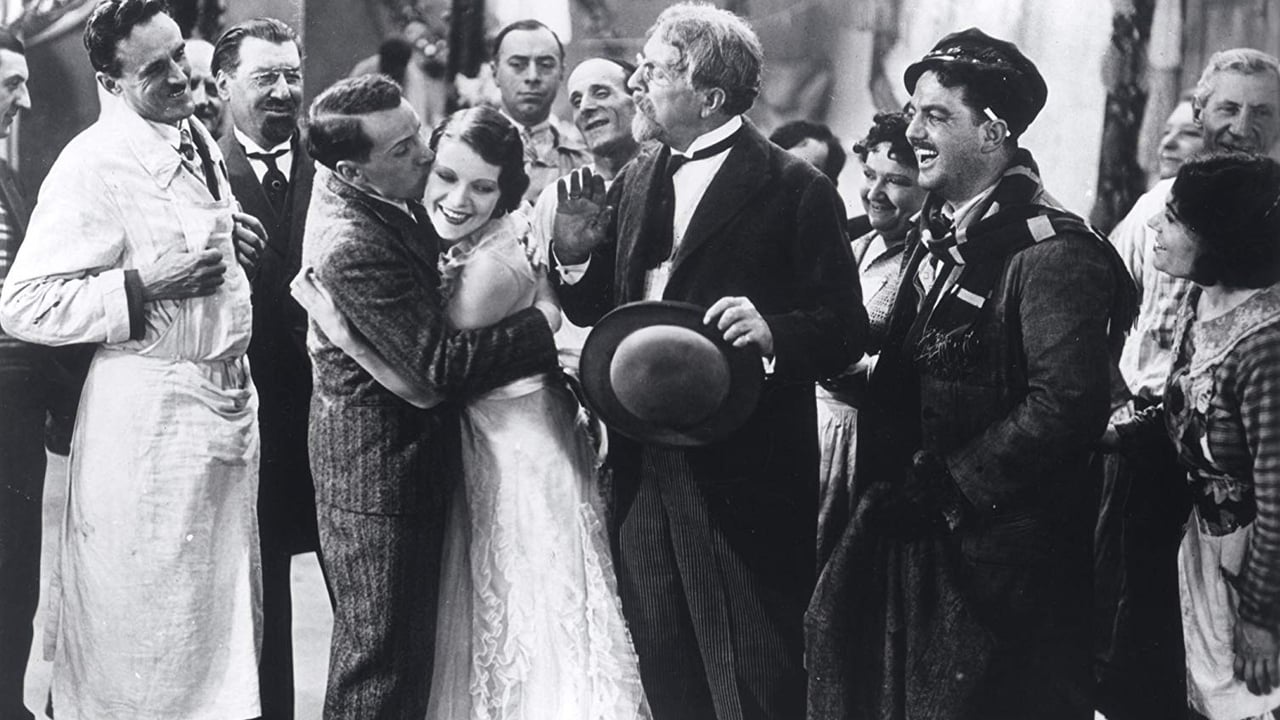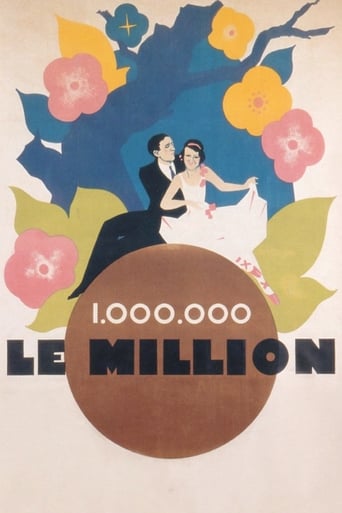



What a waste of my time!!!
A lot of perfectly good film show their cards early, establish a unique premise and let the audience explore a topic at a leisurely pace, without much in terms of surprise. this film is not one of those films.
View MoreIt's a good bad... and worth a popcorn matinée. While it's easy to lament what could have been...
View MoreThe film never slows down or bores, plunging from one harrowing sequence to the next.
View MoreFrench taste-maker René Clair's early talkie, LE MILLION sees him tackle with an archetypal musical experiment, intelligently weaves diegetic aural accompaniment (three composers are involved) into its caper plot, a tuneful piano piece here, a melodious chorus emerging inside a character's head there, and a large chunk of the farce is circumscribed inside a theater where LES BOHÉMINES is on to boot. The plot is a no-brainer, Michel Bouflette (Lefèvre), a down-and-out artist, albeit of being assailed by debtors (butcher, grocer etc.), he is still inclined to cop a feel with a hussy Vanda (Gréville), which ruffles the feathers of his fiancée Béatrice (Annabella). When his friend Prosper (Allibert, devilish handsome) delivers him the thrilling news that they have won the lottery for one million Dutch florins, only to their dismay, the lottery ticket is inside Michel's jacket which has been given away to a criminal mastermind Grandpa Tulip (Ollivier) by Béatrice. So the rest of the story is a race to trace the where-about of the jacket and try to reclaim the ticket, from Grand Tulip's shop, a camouflage for his unlawful business, to a stint in the police office (where Prosper turns Janus-faced), then the opera theater where a tenor Ambrosio Sporanelli (Siroesco) decides to wear the said jacket to perform in public. It is a cat-and-mouse knockabout between team Michael and team Prosper, both are aided by a female sidekick (Béatrice and Vanda respectively), which is a common trope being played again and again ad nauseam, even. While a third party, namely Grandpa Tulip's men, also lay their hands on the jacket, not for the lottery, surprisingly, but to reciprocate the kindness to whom Grandpa Tulip is beholden, which means a celebratory ending! Clair has a distinguished flair in sublimating Parisian cityscape for audience's admiration and a dab-hand who can infuse alluring sophistication into the film's chipper comedic agility and timing, the cast is animated and gung-ho, to a point of betraying an impression of self-awareness, as if to reaffirm their rapt viewers that it is a show for laughter, all in all, a brilliantly maneuvered divertissement throbbing with elation and kinetics.
View MoreThe story is enjoyable fluff, zipping past in a droll flurry of conniving, gaffe, hysterical chase, mistaken identity, public dishonesty, false appearances, and social hypocrisy around money. A snotty starving artist who owes everyone wins the lottery but his fateful jacket upstairs is missing and makes its round of Paris.Now for the musical touch. The jacket ends in the hands of an opera singer who thinks it authentic ('bohemian') enough for his stage costume—it's closing night for a bohemian opera. The singer is rich but gets no satisfaction out of his art, constantly bickers with his co-star, lecherously chases skirt backstage. Our man along with the girl that is secretly in love with him follow the jacket on stage, as curtains go up and the show begins.What follows is a magical moment where the fake bohemian couple provide the song that conciliates the two lovers hiding on the same stage behind a piece of scenery, a marvelous setup. In the dreamlike reality of the musical, the jacket is miraculously retrieved, miraculously snatched away in the next beat, and—lo— miraculously presented again in the finale. All because he realized the richness of love.And how about this as framework? A vast tracking shot opens the film, over a sleeping city to a rooftop where two neighbours peer from a window to wild celebration below. The two of them wonder why the ruckus, which is promptly followed by the dancers relating the story that is our film. I am in awe of how they achieved the shot, it looks like they had to build a few acres of cityscape inside the studio.
View More"Le Million" is a 1931 musical directed by Rene Clair. It's wonderful that it's available on DVD for audiences to see and enjoy it. The story concerns a starving Parisian artist Michele (Rene Lefevre) who is having a bad day. He is being hounded by every creditor in town, and as his fiancé Beatrice (Annabella) walks into his apartment, he is embracing his model. Then he realizes that he has won the Dutch lottery with his friend Prosper (Jean-Louis Allibert), but the ticket is in his coat pocket, and the coat is gone. The city-wide hunt then begins for the coat, which was taken by Beatrice and given to a needy person, who sold it to the opera singer Sopranelli. There is a hilarious scene in Sopranelli's dressing room as various people try to get the ticket out of the coat pocket. Beatrice and Michele wind up behind some scenery on the opera stage and relate to the duet that's being sung.This film and Clair obviously influenced such talents as the Marx Brothers, Ernst Lubitsch, and Rouben Mamoulian. All the performances are good, with the beautiful Annabella, a brunette here, a standout as the ballerina Beatrice. Annabella was signed by 20th Century Fox and brought over to America around 1938, made Suez with Tyrone Power, and the two fell in love and decided to get married. In order to dissuade her and his biggest star from marrying, Zanuck offered her several films in Europe, but she refused to leave her fiancée. Zanuck made sure she didn't work much after that, effectively blacklisting her. She had a big Broadway success, worked on behalf of the troops during World War II, and returned to France after her divorce from Power. She retired in 1954. Her radio work with Power, and this film, show what a wonderful actress she was.Very good film - highly recommended.
View MoreThis film was a disappointment, except for one or two moments (the singing cops/the singing crooks, Grandpa Tulip). It felt like a Marx Brothers movie starring Zeppo and Gummo. There's a great, frothy lightness to the film and the constant sense that something really, really amusing is just about to happen-- but it never actually does. I'd class this picture as "interesting," but not really good except as a curiosity.
View More